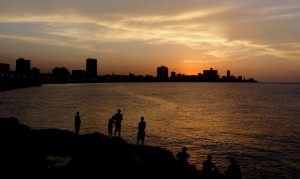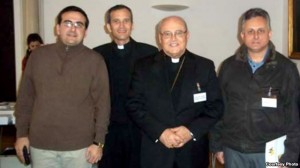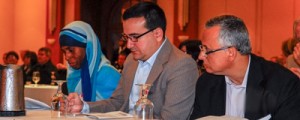 CATHOLIC MAGAZINE FORMER EDITORS PROMOTE “CUBA POSSIBLE” PROJECT.
CATHOLIC MAGAZINE FORMER EDITORS PROMOTE “CUBA POSSIBLE” PROJECT.
Coordinate the work of ‘Cuba Possible’ project, developed by a Christian group. Its members are leftist academics or intellectuals close to the regime.
Roberto Veiga and Lenier Gonzalez, the controversial professional couple who led the magazine Lay Space, henceforth work with a non-Catholic Christian group.
The Christian Centre for Reflection and Dialogue-Cuba (CCRD-C) announced that both add to the Regents of Possible Cuba, a project to “promote Cuba House, that beautiful metaphor Monsignor Carlos Manuel de Céspedes García-Menocal”.
The committee will be led by Rita Maria Garcia Morris, Director of CCRD-C, and the Rev. Raimundo García Franco. Veiga will function as overall coordinator and Gonzalez will be his number two.
A Possible Cuba belong only academic left, as the essayist Víctor Fowler, or intellectuals close to the regime, as Aurelio Alonso, Julio César Guanche, Mayra Espina and Pavel Vidal.
The committee said in a statement that the project “will be inserted in the long tradition of wills, from civil society, religious communities, the diaspora, academia and government agencies, have sought the building, sometimes risky and painful, of a nation reconciled, integrated, balanced and prosperous. ”
“We hope to count on the collaboration of those who are committed to national sovereignty and citizenship, social justice, hope, commitment to the weak and non-violence,” he added.
The Christian Centre for Reflection and Dialogue-Cuba is headquartered in Cardenas, Matanzas, one of the areas of the country where more government violence against the Ladies in White and other opposition movements exercised.
The CCRD-C itself as “a Christian institution for their religious and moral principles, aims and work from the perspective of practical theology and so prophetic, pastoral and holistic by”.
Roberto Veiga and Lenier Gonzalez announced in June that it would work in an independent personal digital platform which serve the dialogue among Cubans.
The exeditores of Lay Space resigned their posts last spring, they said, to avoid “controversy” generated the Catholic magazine.
DDC / InternetPhotos / www.thecubanhistory.com
The Cuban History, Hollywood.
Arnoldo Varona, Editor.
EDITORES DE REVISTA CATÓLICA “ESPACIO LAICAL” PROMUEVEN PROJECTO “CUBA POSIBLE”.
Coordinarán el trabajo del proyecto Cuba Posible, desarrollado por un grupo cristiano. Sus miembros son académicos de izquierda o intelectuales cercanos al régimen.
Roberto Veiga y Lenier González, la polémica pareja profesional que lideraba la revista Espacio Laical, trabajarán en lo adelante con un grupo cristiano no católico.
El Centro Cristiano de Reflexión y Diálogo-Cuba (CCRD-C) anunció que ambos se suman al consejo rector de Cuba Posible, un proyecto para “promover la Casa Cuba, esa bella metáfora de monseñor Carlos Manuel de Céspedes García-Menocal”.
El comité será dirigido por Rita María García Morris, directora del CCRD-C, y por el reverendo Raimundo García Franco. Veiga tendrá funciones de coordinador general y González será su número dos.
A Cuba Posible solo pertenecen académicos de izquierda, como el ensayista Víctor Fowler, o intelectuales cercanos al régimen, como Aurelio Alonso, Julio César Guanche, Mayra Espina y Pável Vidal.
El comité dijo en un comunicado que el proyecto “se insertará en la ya larga tradición de voluntades que, desde la sociedad civil, las comunidades religiosas, la diáspora, el sector académico y las instancias oficiales, han procurado la edificación, a veces arriesgada y dolorosa, de un nación conciliada, integrada, equilibrada y próspera”.
“Esperamos contar para ello con la colaboración de quienes estén comprometidos con la soberanía nacional y ciudadana, la justicia social, la esperanza, el compromiso con los débiles y la no violencia”, añadió.
El Centro Cristiano de Reflexión y Diálogo-Cuba tiene su sede en Cárdenas, Matanzas, una de las zonas del país donde más se ejerce la violencia gubernamental contra las Damas de Blanco y otros movimientos opositores.
El CCRD-C se presenta como “una institución cristiana, por sus principios religiosos y morales, que se orienta y obra desde la perspectiva de la teología práctica y por lo tanto profética, pastoral y holística”.
Roberto Veiga y Lenier González anunciaron en junio que trabajarían en una plataforma digital personal independiente, que sirviera al diálogo entre cubanos.
Los exeditores de Espacio Laical renunciaron a sus puestos la pasada primavera, según dijeron, para evitar “la polémica” que generaba la revista católica.
DDC/InternetPhotos/www.thecubanhistory.com
The Cuban History, Hollywood.
Arnoldo Varona, Editor.







